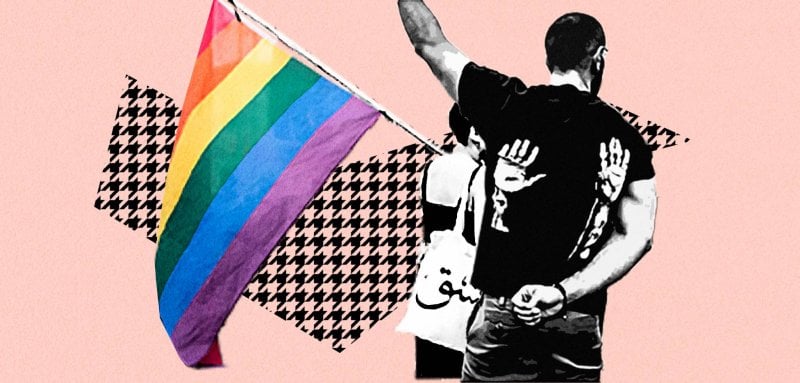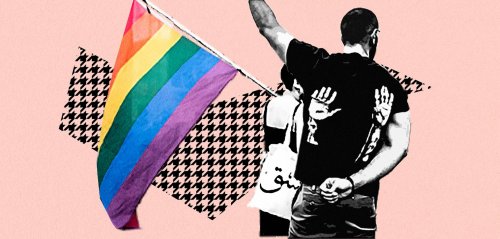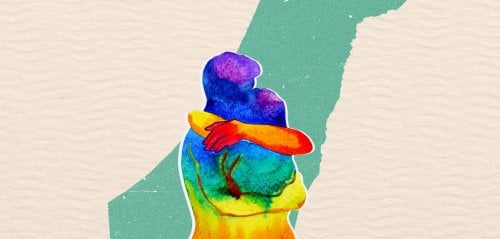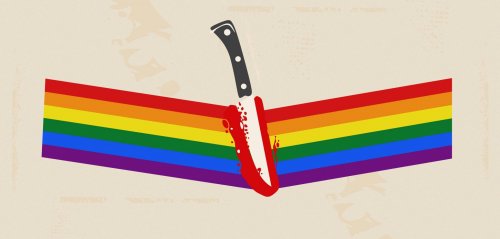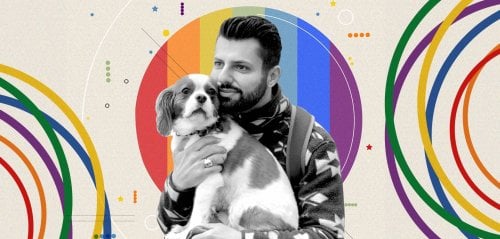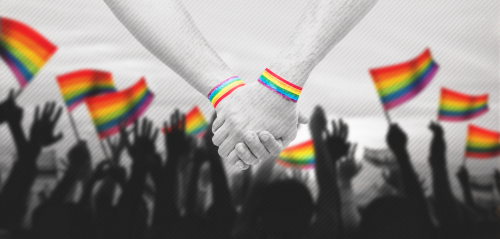On June 9, 2023, 18-year-old queer woman Sarit Ahmad died following multiple gunshots to her upper body at the hands of her brothers near the northern Palestinian town Yarka.
Sarit, who is a resident of predominantly Druze northern village Kisra-Smeia’ was still a minor when she filed a domestic violence complaint against her two brothers in 2020, after threats she received from them due to her sexual orientation. At that time, the two brothers were convicted and detained for 3 and 4 months. Meanwhile, under continued threats, Sarit moved from her home in the village to a shelter for the protection of girls. Later, Sarit decided to move to her sister's house in the village of Sajur in the Galilee, and this week, she was targeted with gunshots while the two brothers have not yet been arrested or charged.
While this is not the first death that a queer Palestinian faces due to their sexual and gender identity, Sarit’s is the first publicly documented death with the queer identity explicitly known as the reason in a familial homophobic attack that state-sponsored institutions and sociocultural factors equally enabled.
Queer Palestinians are worthy of dignity, life and even joy without having to die, yet Sarit’s death is a reminder of the harshness of the lived experiences that many queer Palestinians battle, and the case of urgency for action to improve their circumstances
Queer Palestinians are worthy of dignity, life, and even joy without having to die, yet Sarit’s death is a reminder of the harshness of the lived experiences that many queer Palestinians battle, and the case of urgency for action to improve their circumstances beyond mere survival. Queer Palestinians must not die or live near-death experiences to get a voice as they attempt to endure homophobic state and sociocultural systems that suffocate them to literal and mental, emotional, and psychological deaths.
Sarit’s death highlights a few issues that queer Palestinians, and their allies, must notice even at this traumatic heavy moment of mourning.
Sarit’s death occurs within a broader gun violence plague that has been overwhelming the Palestinian society within the Green Line as the police fail to enact deterrent penalties against criminals or arrest perpetuators under full absence of mechanisms of protection. According to the organization Abraham Initiatives that monitors the gun crisis, 102 Palestinians have died since the year 2023 started. Arab MK (Member of Knesset) Sami Abu Shehadeh has argued for years that not only does Israel neglect organized crime in the Palestinian society inside the Green Line, but it also enables it because the criminals who lead such crime networks are often ex-informants and collaborators whose actions Israel disregards in exchange of their cooperation with Israeli security and intelligence institutions.
Women and children are especially more vulnerable to domestic violence and more likely to be killed under such circumstances. When being queer is considered, Sarit’s murder, on the one hand is just another murder in this absurd reality. On the other hand, however, because of her queerness, Sarit and most queer Palestinians within the Green Line experience a double-edged oppression. First as individuals with no support at the state level or protection from it, and second as pariahs in their society, communities, and families that persist that LGBTQ+ identities could never be part of the Palestinian social fabric.
Queer Palestinians must not die or live near-death experiences to get a voice as they attempt to endure homophobic state and sociocultural systems that suffocate them to literal and mental, emotional, and psychological deaths
MKs such as Ayman Odeh condemned the murder but failed to mention Sarit’s queerness being the reason of the horrific crime against her body and soul. The political leadership of Palestinians in Israel has rarely acknowledged queer rights or anti-queer violence due to the religious opposition to LGBTQ+ people in Palestinian society. For these politicians, the political harm of dealing with the issue far outweighs the benefit. In her response to Sarit’s death on a public Israeli radio, MK Aida Toma Suleiman, who is generally known to be more of a pro-queer politician, like Odeh, talked about the general gun violence crisis and said, “the danger is not faced only by the queer community”. The violence queer Palestinians experience, however, has its own distinctive sense of urgency that requires specific actions aimed at protecting queer lives.
Sarit’s death revealed yet again the severe shortage of resources and absence of response in support of LGBTQ+ Arab youth who leave home due to homophobia. Social workers, psychologists, and housing shelters are almost close to nonexistent today. Palestinian society is more diverse than many think. It is time that our leaders utilize this fact to engage with the possibilities of change in our society, while shaping an understanding that a single set of demands at the collective level will not fit all. There are subgroups that deserve representatives to speak on behalf of their specific needs, and that should not be a threat to the foundations of Palestinian culture as it grows more inclusive.
Despite these complexities, it is just as important to highlight the fact that it is time to call homophobia in the Palestinian society for what it is, a brutal heartless tradition. In queer Palestinian lives, homophobia is as sociocultural as it is colonial. It is only after pursuing queer liberation with this mindset that the fight for change could be whole. Some, including queer Palestinians, might argue that queer Palestinians’ oppression is rooted in the persistence of the occupation and attempting to dismantle it is useless without ending the occupation. While this is true, I am also a firm believer that even the slightest change is valuable, the smallest conversation, any welfare channels, limited or extensive visibility campaigns, media debates, intimate gatherings, safe spaces, and protests whenever and whenever is possible. If we could prevent one death and save the next life, this would all be worth the effort. Grassroot wins count, even at the smallest scale, and this is what queer Palestinians need currently and more urgently.
Most queer Palestinians within the Green Line experience a double-edged oppression; as practically stateless individuals, and as pariahs in their communities and families that insist that LGBTQ+ identities could never be part of the Palestinian social fabric
Sarit’s death has become the most recent of a series of attacks against the queer Palestinian community that has been facing a public growing violence since the summer of 2019, starting with the August 2019 stabbing of a Palestinian teen from the northern village of Tamra by his brother and leading to the historic first demonstration of queer Palestinians in the city of Haifa. This violence, at a deadly cost, has been signaling an upheaval that trembled the public and private spaces and the largely prevailing societal silence on the queer issues in Palestinian society. Sarit’s death, and other violent attacks on queer Palestinians, illustrate the slow yet steady prominence that queer Palestinians have been gaining on multiple fronts and will keep thriving. It is saddening that some must die in the process as life under violence remains the only approach available, but it is thanks to this courage that Palestinians are now arguably past the denial stage of their queer people. Such change we owe to heroes like Sarit who courageously put themselves on the front line to pave a potentially safer path for the rest of us in the future.
Finally, for me personally, following the news on Sarit’s death has magnified the sense of exile I normally live with as a queer Palestinian man in the U.S. since 2011. Hearing news on homophobic attacks in Palestine never gets easier even after all these years. I have been broken hearted and sad for Sarit’s loss. I have been overwhelmed for her friends and the overall LGBTQ +community in Palestine. I felt helpless as I watched the news from afar, knowing I cannot be part of a community I feel a sense of belonging to, yet I cannot be there to support. It felt as though I could not fully live the grief and solidarity that overcame me and wanted to express somehow. I could not express my feelings of anger, devastation, and despair to their full potential under a sense of isolation knowing that I left home due to my queerness over a decade ago. I am not as brave as Sarit Ahmad.
* The views and opinions expressed in this article are those of the author’s and do not necessarily reflect the official policy or position of Raseef22
Raseef22 is a not for profit entity. Our focus is on quality journalism. Every contribution to the NasRaseef membership goes directly towards journalism production. We stand independent, not accepting corporate sponsorships, sponsored content or political funding.
Support our mission to keep Raseef22 available to all readers by clicking here!
Interested in writing with us? Check our pitch process here!
